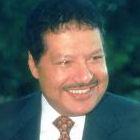

Ghanem told Nature News that the university reneged when it did not receive a guarantee that it would maintain an independent identity.



We must adapt to a new era in the Earth's history by adopting a novel model of economic growth and investing more in technological innovations for the poor, argue Paul J. Crutzen and Christian Schwägerl.
After 10,000 years of the Holocene, the arrival of the Anthropocene — the human era — is an undeniable reality that should be recognised formally, they say.
Renaming our current geological epoch will stress humanity's responsibility as supervisors of the Earth, and highlight our immense intellectual power to shape our future.
This epoch describes humans' dominance of biological, chemical and geological processes on Earth.
By cutting down rainforests, moving mountains to access coal and acidifying coral reefs, we are not just changing the climate but also the biology and geology of the planet "from climate to DNA", say the authors.
Investments in science and technology must increase significantly so we can replace fossil fuels and move towards a sustainable 'bio-economy' to prevent resource wars, they argue.
We need innovations tailored to the needs of the poor — climate-proof crops for small-scale farmers, for example — while global agriculture becomes organic and high-tech.
And to maintain biodiversity, we need a 'green infrastructure' of large areas where organisms and genes can flow freely.
The strategic plans for global conservation and climate change mitigation agreed at the recent UN summits in Nagoya, Japan and Cancún, Mexico offered some hope, say the authors.
"After years of stalemate and the infamous Copenhagen collapse, there is now at least a glimmer of hope that humanity can act together.
Between now and 2020, however, the commitments on paper must be turned into real action," they conclude.
Link to full article in Yale Environment 360
Yale Environment 360
SciDev

Canada is putting 225 million Canadian dollars (US$220 million) into a fund that it says will uniquely help developing world scientists solve health problems facing their regions.
Grand Challenges Canada, launched last week (3 May), claims to break new ground with its approach, which includes seeking developing country scientists to lead its first raft of projects.
The scheme also claims to be the first in which a G8 government links an independent, not-for-profit organisation with its international assistance budget.
The fund seeks proposals for solving five "challenges". So far, only one has been launched — point-of-care diagnostics tools for use in remote developing world locations.
Principal investigators from low- or middle-income countries (LMICs) must lead research into this first challenge, although they are encouraged to collaborate with Canadian scientists.
The aim is "integrated innovation" in which scientific and technological enterprise combine with approaches from the philanthropic and business worlds ensuring outputs reach those who need them, according to Peter Singer, Director of the McLaughlin–Rotman Centre for Global Health at the University of Toronto, where Grand Challenges Canada will be based.
Singer said the programme is also soliciting research into implementation, adding: "This means the researchers will form a single community working together to address a specific challenge".
The approach provides a framework for international cooperation on global issues, he said.
Speaking at the launch, James Flaherty, Canada's minister of finance, said the commitment by the Canadian government would help the "world's best minds" find solutions to global health issues affecting the very poor.
Carel IJsselmuiden, director of the Switzerland-based Council on Health Research for Development, said the initiative "puts a global challenge ... to other countries and regions to redefine how development is being pursued".
"The Canadian government should be congratulated — it is a welcome shift towards a new definition of making development support work. It builds on resident capacity in LMICs."
"This first 'grand challenge' focuses on principal investigators from LMICs only. That is a welcome deviation from the Gates Grand Challenges and others, who recruit for global excellence rather than from LMICs."
He challenged the scheme to maintain this principle for the following Grand Challenges. Otherwise "the jury is still out on how much the overall programme will be able to support researchers from low and middle income countries".
He also queried the extent to which Canadian industry may become involved in the Challenges.
"It is not always clear how to differentiate between Canadian industrial interests and priorities in low and middle income countries. The fact that principal investigators in this call need to come from LMICs seems to be taken as adequate protection that it is LMICs that are mostly served — but with this call we don't see the whole picture."
Grand Challenges Canada fulfils a 2008 Canadian government pledge to set up a Development Innovation Fund. At the time, the federal budget allocated US$49 million, which has now been increased and will be spread over five years. The scheme will be a partnership between Canada's International Development Research Centre, the McLaughlin–Rotman Centre and the Canadian Institutes of Health Research.
The first Challenge will involve collaboration with the Bill and Melinda Gates Foundation, whose own Grand Challenges in Global Health scheme is already funding research in point-of-care diagnostics.
Carol Campbell
SciDev
 foto: NASA John Glenn Research Center
foto: NASA John Glenn Research Center Barack Obama speaking at Cairo University
Barack Obama speaking at Cairo University